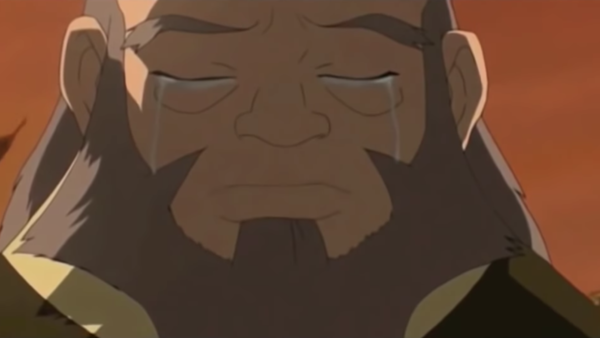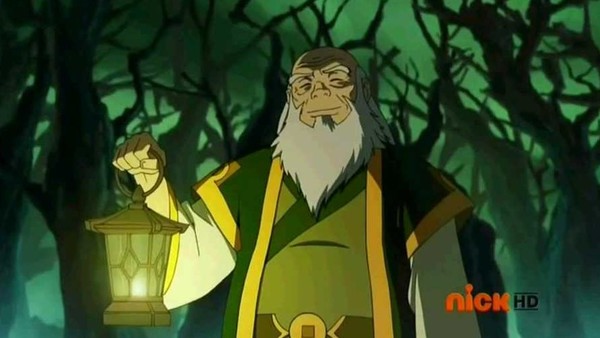Avatar The Last Airbender Theory: Was Uncle Iroh Originally A Spirit?
Before he was selling tea, before he was a Fire Nation Prince, did Iroh's life start as a spirit?

Uncle Iroh is without a doubt one of the most beloved characters in not just animation, but perhaps all of entertainment. One of the many things that made the Last Airbender a trendsetting, ahead of its time, fantasy classic, his wit, calmness under pressure and infallible ability to not give a you-know-what about the world, has made him an icon for an entire generation. However as much as we love his story and personality, there are certain unanswered questions surrounding the former Fire Nation General. One of whom concerns his very origin.
During the two part Book 1 finale, “The Siege of the North”, Admiral Zhao discusses his plans for taking the North Pole with Iroh. It is here, the devious Admiral reveals his true plan: kill the moon spirit. Iroh is visibly distressed at his commander’s callous violence and warns him that the spirits are not be provoked. In response, Zhao says that while he knows about Iroh’s adventures in the Spirit World, he will still not be heeding the General’s advice; drunk on his power and visions of glory.
While these supposed adventures were never mentioned again, it still makes for a very interesting area to speculate on. What did this mean? Did Iroh visit the Spirit World? But how could that happen as at the time only the Avatar was known to be able to cross the boundaries between the Spirit and mortal worlds.
Now yes, there is the possibility Iroh could have used the spirit portal at the North Pole, which as we found out in the Legend of Korra had been accessible all this time. But that would imply he had entered the North Pole before and been allowed to do so by the inhabitants.
Both of which sound highly unlikely.
The next clue regarding Iroh’s origin actually comes in follow-up comics that tell the story of Aang and co. following the end of the 100 Years War. During the third comic arc, titled “The Rift”, Team Avatar come face to face with a vengeful spirit named General Old Iron. The spirit had once served as guardian to his dear friend, the spirit Lady Tienhai. However when Tienhai became welcoming toward humans, Iron left her; warning that these humans would eventually bring forth her doom.
And his claims appeared to come true when Tienhai did in fact pass away and the human King ruling over the region confirmed to Avatar Yangchen that it was indeed his fault she was dead. The Air Nomad Avatar was subsequently able to calm the spirit down and strike a deal.
He would stop attacking humans so long as they stay away from the land
that had been Tienhai’s home. A pact that had remained intact for centuries
until very recently when a corporation half owned by Toph’s father had started mining
the crystals in the area; leading to the creation of a nascent industrial hub.
Iron, angered by the reneging of his deal with Yangchen, starts attacking the city. Aang was initially willing to give in to the spirit’s demands and destroy the city himself but was later stopped by Toph and her metal bending students. And when Iron tries to attack Toph, Aang is left with no choice but to land a full powered Avatar State strike on Iron, forcing his surrender.
Afterwards Aang is distraught at what he had done to the spirit when another spirit appears before him. This was none other than Lady Tienhai herself. Tienhai finally removes the lid from what really happened all that time ago. She had fallen in love with the human king and chose to trade her spirit form for a mortal human body, so she could be with him. She eventually died from natural causes. But the king blamed himself, having been the one who made her accept the mortal form. This was also the reason why he told Yangchen he was the cause of Tienhai’s death.
If we are to connect the dots, what if, just what if Uncle Iroh had a similar origin. He was originally a spirit, but something in the human world won over his heart. Perhaps it was his wife and Lu Ten’s mother. Perhaps, given we never get any mention of his wife, it was actually Lu Ten himself, with Iroh choosing to become human and adopt the boy as his own.
Yes there are lots of gaps that need filling up here. Biggest of which is how and when did he become part of the Fire Nation Family. We don’t know a lot of Fire Lord Azulon’s earlier years or how he brought up his children.
Though another interesting point to note here is that when Azulon was searching for Avatar Roku’s descendants so his own son may marry one of them, he did so with Ozai and not Iroh. Could he have done so because his older son had little interest in marriage or furthering their line? Furthermore, it is a bit curious as to how someone as soft-hearted as Iroh did become Azulon’s preferred heir, given how he is really no different from Ozai with regards to what he expects from his offspring.
Lastly, why did Azulon seemingly change his mind about who should succeed him right before dying? While he must have been in unimaginable pain because of getting poisoned by Ozai, it still doesn’t explain what compelled him to change the royal succession plans on his deathbed. There is also nothing to suggest that Ozai somehow fabricated the order.
Thus, we can certainly ask ourselves if the change in plans came about because Azulon never really intended for Iroh to have the throne, as he was well aware that was not why his supposed son came into this world.
So that was it. And yeah sure enough there is absolutely no definitive way of making a conclusion yet, but nonetheless given everything we do know, it wouldn’t be entirely ludicrous to suggest that perhaps Uncle Iroh was originally a spirit.